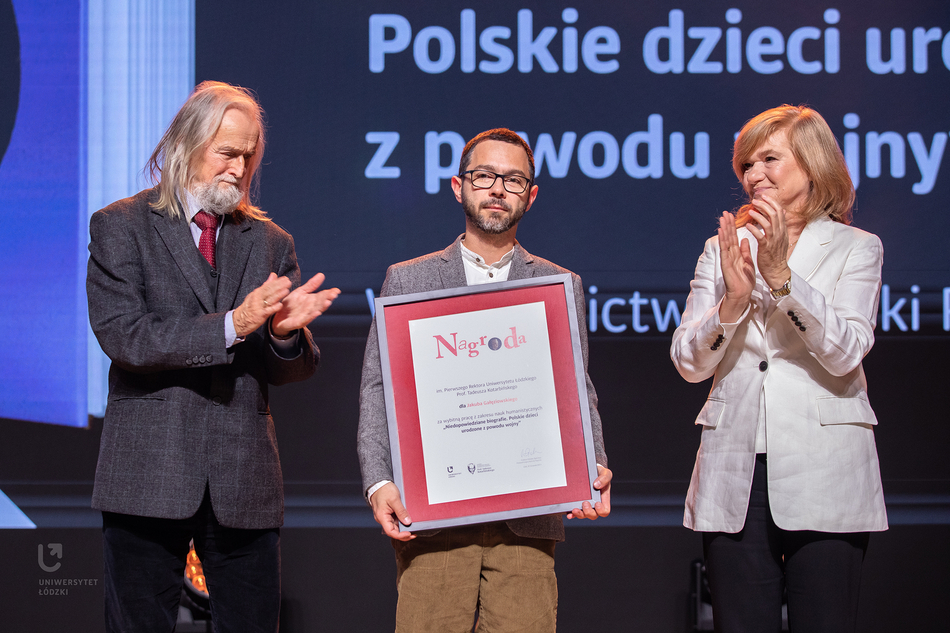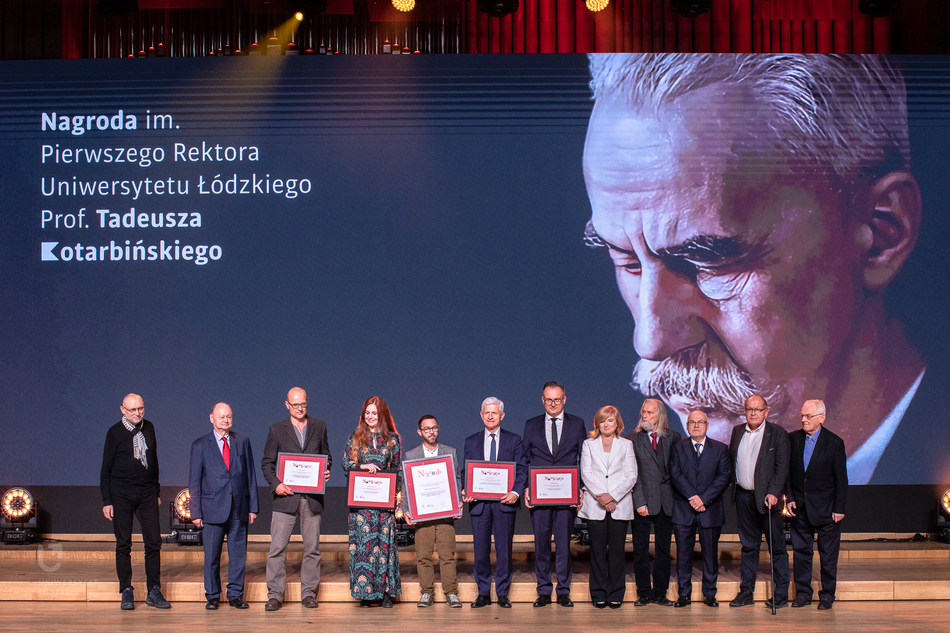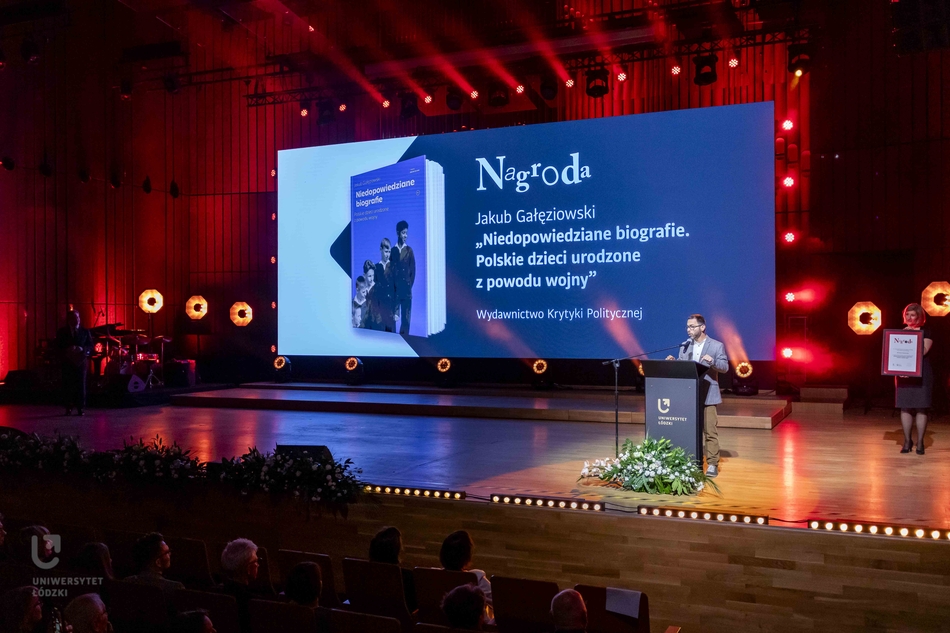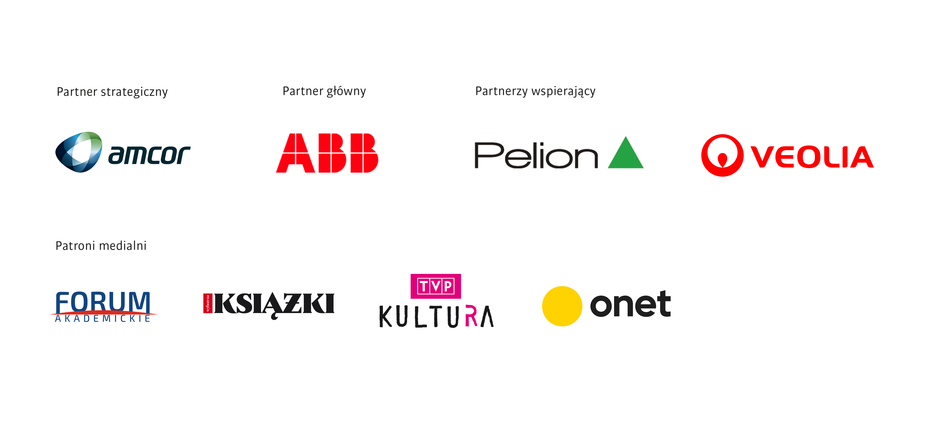 Dr Jakub Gałęziowski – the winner (in the middle) with the Rector of the University of Lodz, Prof. Dr hab. Elżbieta Żądzińska and Prof. Tadeusz Sławek, member of the Jury of the Prof. Tadeusz Kotarbinski Award
Dr Jakub Gałęziowski – the winner (in the middle) with the Rector of the University of Lodz, Prof. Dr hab. Elżbieta Żądzińska and Prof. Tadeusz Sławek, member of the Jury of the Prof. Tadeusz Kotarbinski Award
The Prof. Tadeusz Kotarbinski Award competition is a great promotion of research, publications in the field of humanities and the humanities themselves. This is the only independent prize of its kind in Poland, awarded to scientists by a scientific institution. The competition established by the University of Lodz in 2015 has so far received a total of more than 540 entries from 145 Polish research centres. Forty-five outstanding books have made it to the finals of all editions of the competition. This year, for the first time in the competition's nine-year history, the Chapter has decided to increase the prize from PLN 50,000 to PLN 70,000. According to the nominees themselves, this is the most important competition for humanists in Poland. We all need humanistic reflection, especially in the face of conflicts and tensions in the world.
The fate of Polish children whose birth was marked by war
Jakub Gałęziowski obtained the PhD degree in History from the University of Augsburg and the University of Warsaw. He is involved in social history, oral history and biographical research. He is interested in ethical aspects and the role of emotions in scientific research. He says of himself: "I bake buns, pick berries and wild strawberries, make jam, water the flowers, listen to Czereśnie and read books aloud to children. I relax in the forest and when I talk to people (oral history). I am discovering the Middle East, once thanks to travels there, today thanks to those who come here."
The subject of my book concerns the fate of Polish children born during and just after the Second World War: these are people who were born into situations marked by war, occupation, forced labour or captivity. However, their biological parents were on the opposite sides of the barricade: one, usually the mother, was a member of the occupied community; the other, usually the father, was an invader (occupier). The book reveals the fate of Polish children conceived from relationships of varying degrees of coercion/voluntariness and as a result of wartime sexual violence. "Niedopowiedziane biografie" is the result of the first research on Polish children born of war (a term which has been used for over twenty years in scientific and humanitarian discourse)
– said the winner about his book.
The book by Dr Gałęziowski is special. It concerns people who do not formally fight, are not representatives of the craft of war, on the contrary, they are the embodiment of life that requires peace and care, they are the source of life and a synonym of caring for it. It is a book about women's war experience, even about a certain pattern of women's experience of war, a pattern that also includes children who bear the burden of the war reality, which was not their fault. These included children of German occupiers, children of prisoners of war and children of forced labourers, female prisoners of war and the most numerous group, namely the children of Red Army soldiers, children of rape...
– Prof. Tadeusz Sławek, a member of the Award Jury, justified the choice.
 The nominees together with the Jury members on stage at the Łódź Philharmonic
The nominees together with the Jury members on stage at the Łódź Philharmonic
Sixty-one works from all over Poland in the 9th edition of the Prof. Tadeusz Kotarbinski Award competition
The 9th edition of the competition received 61 entries, of which the Award Jury selected five finalists. These are not only academic works; these are books that deal with the most important contemporary problems. The finalists included:
- Dr hab. Anna Róża Burzyńska "Atlas anatomiczny Georga Büchnera" Jagiellonian University Press, Theatre and Drama Department, Faculty of Polish Studies at the Jagiellonian University
- Dr Jakub Gałęziowski "Niedopowiedziane biografie. Polskie dzieci urodzone z powodu wojny", Publishing House of Krytyka Polityczna, the work submitted by the Faculty of Culture and Arts, University of Warsaw
- Dr Piotr Kendziorek "Filozofia wobec Zagłady. Koncepcje teorii krytycznej Martina Heideggera i poststrukturalizmu", Jewish Historical Institute
- Prof. Dr hab. Roman Kuźniar "Zmierzch liberalnego porządku międzynarodowego 2011-2021", affiliation: Faculty of Political Science and International Studies, University of Warsaw, Scholar Publishing House
- Dr hab. Mateusz Wyżga, Associate Professor at the University of the National Education Commission, Krakow, "Chłopstwo. Historia bez krawata", affiliation: Institute of History & Archival Studies, University of the National Education Commission, Krakow, Znak Social Publishing Institute.
These are books that move you to the depths of your soul. I strongly encourage you to read them, especially since modern times pose more and more challenges: Ukraine is still fighting against the Russian aggressor, we are witnessing alarming developments in the Middle East, tensions and conflicts are rising and divisions are becoming more pronounced. With a humanistic view we can, as a society, understand the past, understand the present in order to make the best choices in the future
– said the University of Lodz Rector, Prof Dr hab. Elżbieta Żądzińska.
 The speech by the winner of this year's 9th edition of the Competition, Dr Jakub Gałęziowski, after the announcement of the verdict.
The speech by the winner of this year's 9th edition of the Competition, Dr Jakub Gałęziowski, after the announcement of the verdict.
The Jury of the Prof. Tadeusz Kotarbinski Award is composed of eminent Polish scientists:
- Prof. Krzysztof Jasiecki – a political scientist and a sociologist from the SGH Warsaw School of Economics and the University of Warsaw;
- Prof. Ryszard Kleszcz from the Institute of Philosophy of the University of Lodz;
- Prof. Anna Legeżyńska – a literature researcher from Adam Mickiewicz University, Poznań;
- Prof. Włodzimierz Nykiel from the Faculty of Law and Administration of the University of Lodz, Rector of the University of Lodz from 2008 to 2016;
- Prof. Tadeusz Sławek – a Polish and English philologist from the University of Silesia, Rector of the University of Silesia from 1996 to 2002;
- Prof. Rafał Stobiecki from the Institute of History, University of Lodz;
- Rev. Prof. Andrzej Szostek – Rector of the John Paul II Catholic University of Lublin in 1998-2004, currently an ethicist at the UMCS and the University of Warsaw;
- Prof. Elżbieta Żądzińska – Rector of the University of Lodz (President of the Jury).
Prof. Tadeusz Kotarbiński – patron of the Award
Professor Tadeusz Kotarbiński, the patron of the award, was an eminent philosopher, a logician and an ethicist. Prof. Tadeusz Kotarbiński was a representative of the Lwów-Warsaw school of philosophy. After the Second World War he moved to Lodz, where he became one of the founders of the University of Lodz and its first Rector. One of Professor Kotarbiński's best-known works is the "Treatise on A Good Job" devoted to praxeology, or the theory of efficient action.
This year's Competition partners were:
- Amcor (Strategic Partner of the 9th edition of the Competition),
- ABB (the main partner),
- Pelion and Veolia (supporting partners).
 We would like to thank our partners for supporting the Polish humanities, Polish science.
We would like to thank our partners for supporting the Polish humanities, Polish science.
Source: Honorata Ogieniewska (Communications and PR Centre, University of Lodz)
Tekst i redakcja: Marcin Kowalczyk (Communications and PR Centre, University of Lodz)
Zdjęcia: Maciej Andrzejewski, Bartosz Kałużny (Communications and PR Centre, University of Lodz)
